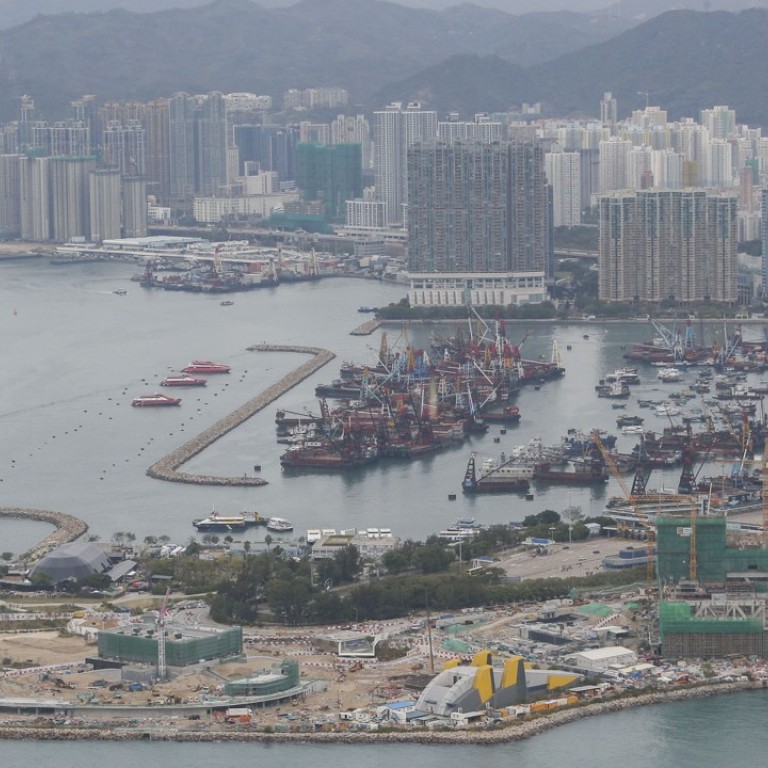
Troubled West Kowloon Cultural District to seek extra HK$11.7 billion for deficits next 15 years
Authority tells sceptical lawmakers loans or bonds needed to close funding gap at controversial arts hub
Hong Kong’s multibillion-dollar West Kowloon Cultural District was called a “fiscal abyss” on Friday as its board planned to issue bonds or borrow loans to fill a funding gap of HK$11.7 billion (US$1.5 billion) in the face of deepening deficits for up to the next 15 years.
The loan plan was revealed at a Legco panel meeting attended by former chief secretary Henry Tang Ying-yen, now chairman of the West Kowloon Cultural District Authority. For the first time since taking up his position last October, Tang delivered a report to lawmakers on the project’s latest financial situation.
Spat over Cantonese opera theatre’s grand opening latest drama at Hong Kong arts hub
The chairman said the upfront endowment of HK$21.6 billion granted to the authority in 2008 would only cover the design and construction costs for Batch 1 and most Batch 2 facilities but not the remaining Batch 3 facilities. This would result in a capital funding gap of HK$11.7 billion based on 2016 prices to complete the rest of the project.
“We originally envisaged an investment return of 6 per cent every year but due to the financial tsunami in late 2008 the actual annual return only stood at 3 per cent,” Tang explained. “Also, the construction cost has soared by 136 per cent. Therefore, we need to borrow loans or issue bonds to cope with this funding gap for the medium term.”
The construction cost has soared by 136 per cent
However, Tang stopped short of disclosing the exact amount to be requested, noting a financial adviser would be hired to draw up the loan plan.
“The West Kowloon project will start to incur an operating deficit from 2018/19,” he said. “Thereafter, it will face a prolonged and increasing structural operating deficit for running Batches 1 and 2 of the facilities.”
The authority projected that with the opening of Xiqu Centre and Art Park later this year, it would face a deficit of HK$312 million in 2018/19. With the opening of more arts and cultural facilities such as Freespace and M+, it was expected the operating deficit would reach HK$626 million in 2019/20 and HK$771 million the year after.
In other words, for the three-year period from next year onwards, the project would face an estimated deficit of HK$1.7 billion.
Permanent Secretary for Home Affairs Betty Fung Ching Suk-yee also noted the authority would not balance its books for the next 10 to 15 years.
“But when the district’s commercial facilities such as retail, hotel and offices are running in full swing, we believe the project could generate profits,” she said.
The commercial facilities would be developed under a build-operate-transfer model for a period of 34 years. Once that term expires, the premises would be handed over to the authority. The selected developers would then need to split their income with the authority.
To date, the hub’s total price tag remains unknown. Critics expect it to cost more than HK$70 billion, as the authority is still reviewing other facilities and programmes.
But most lawmakers expressed unhappiness with the plan on Friday over its lack of detail. Lawmaker Claudia Mo Man-ching said: “This project is really a bottomless pit.”
Harbour view at Hong Kong Cultural Centre ‘impractical’ says building’s engineer
Civic Party’s Tanya Chan complained the project had been in constant flux since 2008, with some of the facilities revised, combined or simply removed.
“How can we trust that this latest funding plan can resolve the deficit problems?”
Chan also asked why the authority chose to issue bonds or borrow loans instead of seeking extra funding from Legco. “Are you trying to escape our scrutiny?” she asked.

